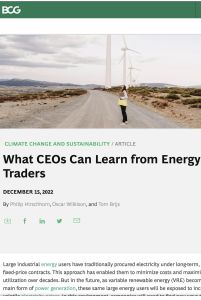Power generation is changing. When energy was produced through the relatively straightforward and stable process of burning fossil fuels, companies could secure long-term, low-price contracts with energy producers, then run their equipment around the clock to maximize profits. But what do you do when energy prices depend on forces as unruly as sunshine and wind? You get really flexible, really fast. This special report from the Boston Consulting Group can tell you how.
With fixed, low-cost energy contracts, 24-hour production was the best strategy, but price volatility inherent in VRE (variable renewable energy) will change that.
The most profitable way of operating an industrial company has been clear from the beginning: Make the most of your equipment and facilities by running production around the clock. The transition to VRE will require a change in strategy. Flexibility will be crucial, particularly when it comes to using energy-intensive assets. The key is to trade maximum utilization for optimum utilization.
South Australian energy markets offer a powerful example of how companies can profit from energy flexibility: If a company were to shift production to times when energy was cheapest (which accounts for about 55% of the time), that company would enjoy energy that was essentially zero cost throughout 2021. If a company simply avoided producing during periods of high-cost energy (about 20% of the time), it would save about 65% on energy costs when compared to companies that ignore price volatility completely.
Companies will need to take on an “energy...









Comment on this summary